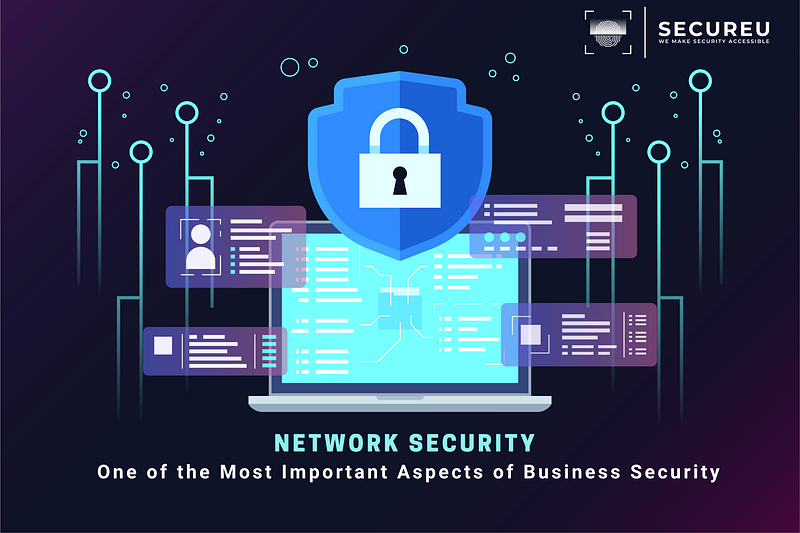Network Security: One of the Most Important Aspects of Business Security
Today’s network architecture is intricate and the environment is full of ever-changing threats with attackers constantly trying to find and exploit vulnerabilities. Many areas are prone to having vulnerabilities including devices, data, applications, users, and locations. This is the explicit reason why a vast number of network security tools and applications exist.
These tools and applications help address individual threats and exploits along with regulatory non-compliance. A few minutes of downtime can greatly damage an organisation’s bottom line and reputation, this is why it is essential to make sure that network security measures are firmly in place.
Enterprise networks are generally big and complex and rely on a number of connected endpoints. Although this is good for business operations and makes workflow easier to maintain, it even presents a security challenge. Flexibility of data transport in a network means that if a malicious actor gains access to your network, they can easily move around and cause a lot of damage without your knowledge. Such network security threats can make your organisation very vulnerable to data breaches.

What is Network Security?
Network security is a subset of cybersecurity. It is a group of technologies that protect the usability and integrity of a company’s infrastructure by warding off the entry or propagation of a wide variety of threats within a network.
Network security architecture comprises tools that defend the network as well as the applications that run on it. Good network security strategies implement many lines of defence that can be scaled and also automated. Every defensive layer imposes security policies that are decided by the administrator.
Network security protects your company’s network from falling prey to data breaches, intrusions, and other threats. It consists of both hardware and software solutions along with processes or rules and configurations related to network use, accessibility, and overall threat protection.
Why is Network Security Important?
Network security is a crucial aspect to take into consideration when you are working over the Internet, LAN, or another method, regardless of the size of your business. Although no network is secure against attacks, a stable and well-planned network security system is necessary for protecting client data. Efficient network security systems allow businesses to reduce the risk of becoming prey to data theft and sabotage.
Network security can help protect workstations from harmful spyware and also ensure the security of shared data. Network security infrastructure provides multiple levels of protection to avoid man-in-middle attacks by dividing information into several parts, encrypting these parts, and transporting them via independent paths, thus preventing eavesdropping.
Being connected to the Internet means that you may get a lot of traffic. Huge amounts of traffic can cause instability and lead to vulnerabilities in the system. Network security boosts the reliability of your network by preventing lags and downtimes through constant monitoring of any suspicious transactions that could sabotage the system.
How Does Network Security Work?
When addressing network security, there are many layers to consider across an organisation. Attacks can occur at any layer in the network security layers mode, thus hardware, software, and policies need to be architected to address each area.
Network security generally consists of 3 types of controls: Physical, Technical, and Administrative. Let’s take a look at them:
- Physical Network Security: Physical security controls are formulated to thwart unauthorised personnel from getting physical access to network components like routers, cabling cupboards, etc. Controlled access like locks, biometric authentication, and other devices is crucial in any organisation or business.
- Technical Network Security: Technical security controls protect data stored on the network that is being transported across, into, or out of the network. It needs to protect data and systems from unauthorised access, and also protect against malicious activities from employees.
- Administrative Network Security: Administrative security controls comprise security policies and processes that supervise user behaviour, including the authentication of users, their level of access, and also how IT staff members apply changes to the infrastructure.
Network Security Risks
Networks face many risks in the ever-changing digital world. Here are a few of them:
- Supply Chain Attacks: These attacks aim to gain access to source codes, build processes, or update mechanisms by infecting legitimate applications to distribute malware. It attempts to damage an organisation by attacking less secure elements in the supply chain.
- Computer Virus: These are pieces of software that have been created to spread from one computer to another. They are usually sent as email attachments or downloaded from websites with the intention of infecting your computer and other computers in your contact list by using systems on your network.
- Thread Hijacking: This attack is a method of executing random code in the address space of a live process. It is generally performed by suspending an existing process and hollowing its memory and replacing it with malicious code or the path to a DLL.
- Remote Access Vulnerabilities: Remote access means connecting to IT services, applications, and data from a remote location, i.e. any location other than the headquarters. This connection enables users to access a network or computer remotely through the internet. Lack of proper security such as improper physical security controls can lead to vulnerabilities in remote access.
- Cloud Privilege Escalation: Privilege escalation vulnerabilities are flaws in the system that grant malicious users excessive or incorrect permissions after they have authenticated themselves. Cloud security is an important concept that businesses need to be aware of.
What Are the Types of Network Security Solutions?
Let’s take a look at some of the different ways that networks can be secured:
- Antivirus and Antimalware Software: These software safeguard organisations from a wide array of malicious software like viruses, ransomware, worms, and trojans. The most efficient software not only scans files upon entry into the network but also continuously scans and tracks files.
- Network Access Control: NAC can be set at the most basic level. It helps make sure that possible hackers cannot invade your network by putting comprehensive access control policies in place for users as well as devices. For instance, you can grant administrators full access to the network but prohibit access to specific confidential folders. You can even stop their personal devices from joining the network.
- Virtual Private Networks: VPNs create connections to networks from other endpoints or sites. Users working from home usually connect to the organisation’s network over a VPN. The data passing between these two points is encrypted and the user would have to authenticate to allow for communication between their device and the network. Choosing a good VPN is an important part of network cybersecurity.
- Firewall Protection: As the name implies, firewalls act as barriers between untrusted external networks and trusted internal networks. Usually, administrators design a set of rules that stop or allow traffic onto the network. This can help prevent malicious files and actors from making their way into a network and causing all kinds of trouble.
- Intrusion Detection and Prevention Systems (IDPS): These systems can be deployed directly behind firewalls to provide an extra, second layer of defence. They usually work together with their predecessor, the intrusion defense system (IDS) which is more passive. An IDPS stays between the source address and its destination and creates an extra stop for traffic before it can enter a network. An advanced IDPS can use machine learning and AI to scrutinise incoming data and trigger automated processes such as blocking traffic from the source if it detects suspicious activity.
How Does SECUREU Provide Network Security?
SECUREU understands the need for secure and impenetrable networks which is why our team works very hard to ensure its safety. Let’s take a look at how we secure your network:
- Our team performs intensive penetration testing on your network. They access your entire network — be it your internal network or an ad-hoc network — and discover every available asset on that network.
- They then proceed to find vulnerabilities for each and every server and machine present on that network. This intensive network penetration testing helps businesses keep their data safe from getting leaked or manipulated.
- Next, they ensure the integrity of data on your network. Often, some users may have privileges that they do not require. This can cause network security issues in the long run which is why we keep a vigilant eye out for it.
- Once a vulnerability has been found on your network, our experts then escalate the aforementioned vulnerability to gain the maximum level of access in that network. This helps them cover the entire scope of possible exploitation and make sure that no edge cases remain for unwanted malicious actors to wreak havoc inside your system.
The security of your network is one of our biggest priorities and responsibilities which is why you can rest assured when our team is working on securing your network.
Reach out to us today & let’s talk about how we can help you!
Website: https://secureu.in | E-mail: contact-us@secureu.in | Contact us: Instagram, Twitter Youtube & LinkedIn

